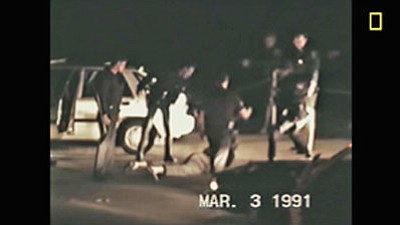BALTIMORE — Dan Lindsay and TJ Martin were both in grade school when the Los Angeles riots of 1992 erupted in the aftermath of a verdict that acquitted police officers in the shocking videotaped beating of motorist Rodney King.
Lindsay, 13 at the time, lived in Rockford, Illinois and “was probably trying not to get beat up in middle school,” he joked. Martin, 12 at the time, lived in Seattle.
However, as history would have it, the two would come together 25 years later to direct a new movie from National Geographic Documentary Films that explores the infamous King beating and the ensuing riots, one-quarter of century after it gripped the nation.
Courtesy Photo/National Geographic
The documentary LA92 debuted on Friday, April 21, 2017 at the Tribeca Film Festival in New York and it’s scheduled for a limited theatrical release in New York and Los Angeles on Friday, April 28. The film will then make its television broadcast debut on National Geographic on Sunday, April 30.
The film, LA92, counts as a riveting look back at the controversial trial of the officers, subsequent protests, police brutality, and judicial bias through rarely seen archival footage.
It debuted on Friday, April 21, 2017 at the Tribeca Film Festival in New York and it’s scheduled for a limited theatrical release in New York and Los Angeles on Friday, April 28. The film will then make its television broadcast debut on National Geographic on Sunday, April 30.
“We worked on the film for about nine months and because it was archive-driven, we probably squeezed about two years of work into a nine-month period,” said Martin, who along with Lindsay won an Oscar for Undefeated.
The anniversary of that fateful day proved an impetus for mostly everyone involved in the project, Lindsay said.
“For TJ and I, our vision was less about the anniversary and more about an opportunity to explore a moment in history. A very relevant moment that’s important today and it’s one that allows you to explore America through the microcosm of this event,” Lindsay said.
The goal “is to reframe the story of this tragedy for our modern audience, and we hope it will encourage reflection and debate as we wrestle with these very real conflicts that continue to plague America’s cities,” Martin said.
Lindsay and Martin gathered numerous amount of archived footage from news, radio, personal home videos and police reports. Some of the videos, they say, had never seen the light of day.
Thus, LA92 features a host of rarely and never-before-seen video which not only captured the violence and the protests, but the effect the burning of a Los Angeles community had on Korean merchants who fled the area after the riots.
“We had a private screening and a gentleman who grew up in Watts during the 1965 unrest there–and who lived through the 1992 unrest–noted how he still harbored a sense of animosity toward the Korean Merchants because he felt there was a lot of exploitation,” Martin said. “After watching the film, he shared with us that he never really felt emotionally what the merchants had gone through and in doing so, in viewing the film, it shed new light on how he viewed the immigrant experience.”
Even though there are a handful of other films about the 1992 unrest scheduled to be released on the anniversary, this month Martin and Lindsay say they don’t view those as competition.
“Going into the project we realized that many of the takeaways were insufficient,” Lindsay said, noting that, because of their age, there is a bit of a disconnect compared with others who may have been old enough to understand in the moment, the significance of what happened.
“Our disconnect from the material was primarily because of our age,” Martin said. “Revisiting the footage first and thinking of how to make those memories and bring them to life while adding to the conversation [was the goal],” he said.
And, King’s now-famous “Can’t we all just get along” proclamation served as a flashpoint.
“That became a pop culture statement, almost a joke at a certain point,” Lindsay said. “But, you take moments like that and you lead the audience to when Rodney King gets up to speak, now you are there and hopefully, you have more empathy.”

